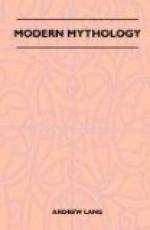That is our general position, and it would have been a benefit to us if Mr. Max Muller had stated it in his own luminous way, if he wished to oppose us, and had shown us where and how it fails to meet the requirements of scientific method. In place of doing this once for all, he often assails our evidence, yet never notices the defences of our evidence, which our school has been offering for over a hundred years. He attacks the excesses of which some sweet anthropological enthusiasts have been guilty or may be guilty, such as seeing totems wherever they find beasts in ancient religion, myth, or art. He asks for definitions (as of totemism), but never, I think, alludes to the authoritative definitions by Mr. McLennan and Mr. Frazer. He assails the theory of fetishism as if it stood now where De Brosses left it in a purely pioneer work—or, rather, where he understands De Brosses to have left it. One might as well attack the atomic theory where Lucretius left it, or the theory of evolution where it was left by the elder Darwin.
Thus Mr. Max Muller really never conies to grips with his opponents, and his large volumes shine rather in erudition and style than in method and system. Anyone who attempts a reply must necessarily follow Mr. Max Muller up and down, collecting his scattered remarks on this or that point at issue. Hence my reply, much against my will, must seem desultory and rambling. But I have endeavoured to answer with some kind of method and system, and I even hope that this little book may be useful as a kind of supplement to Mr. Max Muller’s, for it contains exact references to certain works of which he takes the reader’s knowledge for granted.
The general problem at issue is apt to be lost sight of in this guerilla kind of warfare. It is perhaps more distinctly stated in the preface to Mr. Max Muller’s Chips from a German Workshop, vol. iv. (Longmans, 1895), than in his two recent volumes. The general problem is this: Has language—especially language in a state of ‘disease,’ been the great source of the mythology of the world? Or does mythology, on the whole, represent the survival of an old stage of thought—not caused by language—from which civilised men have slowly emancipated themselves? Mr. Max Muller is of the former, anthropologists are of the latter, opinion. Both, of course, agree that myths are a product of thought, of a kind of thought almost extinct in civilised races; but Mr. Max Muller holds that language caused that kind of thought. We, on the other hand, think that language only gave it one means of expressing itself.
The essence of myth, as of fairy tale, we agree, is the conception of the things in the world as all alike animated, personal, capable of endless interchanges of form. Men may become beasts; beasts may change into men; gods may appear as human or bestial; stones, plants, winds, water, may speak and act like human beings, and change shapes with them.




